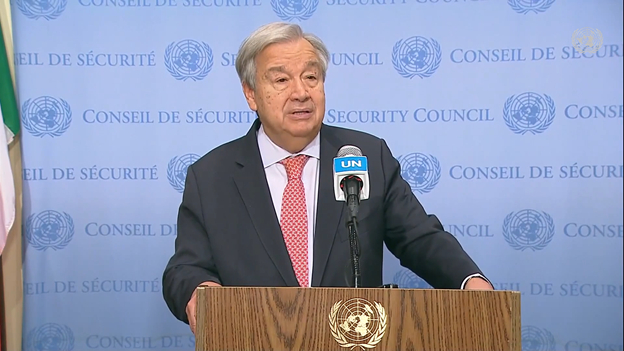
Thank you very much for your presence.
Exactly four weeks after the humanitarian conference in Geneva, the humanitarian crisis is growing in Afghanistan — and so is the United Nations response to deliver for the Afghan people.
The crisis is affecting at least 18 million people — half of the country’s population.
Despite financial shortfalls, logistical challenges, and an increasingly complex geo-political situation, we are undertaking a massive humanitarian operation in the country.
I am particularly proud of the work of our colleagues, the vast majority of whom are Afghan nationals.
In September alone,
• more than 3.8 million people received food assistance;
• 21,000 children and 10,000 women received treatment for acute malnutrition;
• 32,000 people received non-food items including blankets and warm clothes for winter;
• 10,000 children were reached with community-based education activities;
• 450,000 people were reached with primary and secondary healthcare;
• 160,000 farmers and herders were provided with livelihoods support;
• 12,000 people received emergency psycho-social and mental health support;
• 186,000 drought-affected people received water;
• and 150,000 people received hygiene promotion and hygiene kits.
Last week alone,
- WFP conducted simultaneous food distributions in Kabul, Herat, Mazar, and Kandahar in a single day;
- WHO delivered medical supplies to treat 10,000 people with acute watery diarrhea — and opened two new COVID-19 labs;
- More than 170 UNFPA-supported “Family Health Houses” in remote areas were provided medical supplies for services through the end the year. These facilities, on average, enable around 11,000 safe birth deliveries each year;
- UNFPA also delivered Emergency Reproductive Health kits for 3,100 women to Kandahar Regional Hospital and Kunduz Regional Hospital;
- UNHCR, UNICEF and NGO partners reached well over 36,000 displaced and vulnerable Afghans during the week with core relief items and cash assistance;
- FAO and NGO partners delivered more than 870 metric tonnes of concentrated animal feed.
This is one week alone of work.
UN agencies and humanitarian NGOs in Afghanistan are in a race against time to deliver life-saving aid to crisis-affected people and pre-position supplies ahead of winter.
They won’t let up.
They have been acting with the cooperation of the Taliban, who have progressively granted access to the areas requested and provided security when needed. The number of incidents during humanitarian operations has been in constant decline.
Humanitarian assistance saves lives. But it will not solve the problem if the economy of Afghanistan collapses.
We also need to make sure we do everything we can to prevent the economic collapse of the country.
Already before the Taliban takeover in August, Afghanistan’s fragile economy -- which has been kept afloat by foreign aid over the past twenty years -- suffered from the impact of drought and COVID.
Right now, with assets frozen and development aid paused, the economy is breaking down. Banks are closing and essential services, such as healthcare, have been suspended in many places.
We need to find ways to make the economy breathe again.
This can be done without violating international laws or compromising principles.
We must seek ways to create the conditions that would allow Afghan professionals and civil servants to continue working to serve the Afghan population.
I urge the world to take action and inject liquidity into the Afghan economy to avoid collapse.
Clearly, the main responsibility for finding a way back from the abyss lies with those that are now in charge in Afghanistan.
Since their takeover, the Taliban have – at various times – promised Afghan citizens — including women, children, minority communities, former government employees — that they would protect their rights.
Central to those promises was the possibility of women to move, to work, and to enjoy their basic rights — and for girls to have effective access to all levels of education, the same as boys.
Gender equality has always been an absolute priority for me.
In my visits to Afghanistan, I was deeply moved by the courage, the resilience and determination of Afghan women and girls.
I am particularly alarmed to see promises made to Afghan women and girls by the Taliban being broken.
Broken promises lead to broken dreams for the women and girls of Afghanistan.
Since 2001, three million girls have enrolled in school and average schooling has increased from six years to 10.
Women and girls need to be the centre of attention.
Their ability to learn, work, own assets, and to live with rights and dignity will define progress.
Eighty percent of Afghanistan’s economy is informal, with obviously a preponderant role of women.
Without them, there is no way the Afghan economy and society will recover.
I strongly appeal to the Taliban to keep their promises to women and girls and fulfill their obligations under international human rights and humanitarian law.
For our part, the UN is permanently engaging with the Taliban on the safety and security of our staff, humanitarian assistance and unhindered access for all, including female staff, and human rights with particular focus on women and girls’ rights.
This is a make or break moment.
If we do not act and help Afghans weather this storm, and do it soon, not only they but all the world will pay a heavy price.
Without food, without jobs, without their rights protected, we will see more and more Afghans fleeing their homes in search of a better life.
The flow of illicit drugs, criminal and terrorist networks will also likely increase.
This will not only badly affect Afghanistan itself, but also the region and the rest of the world.
We all must do our part.
Thank you.






